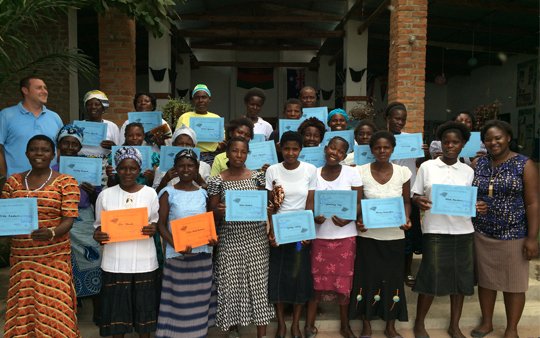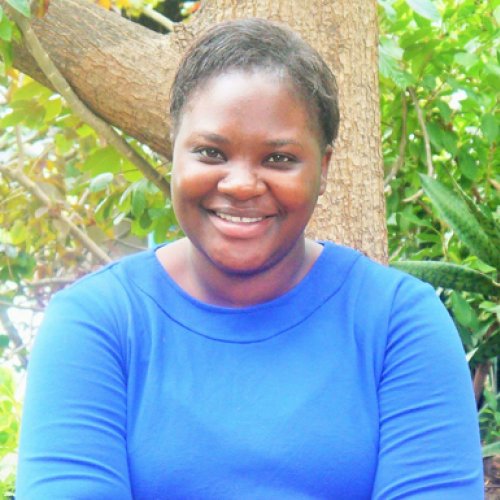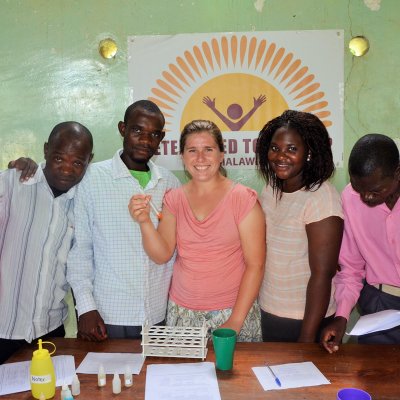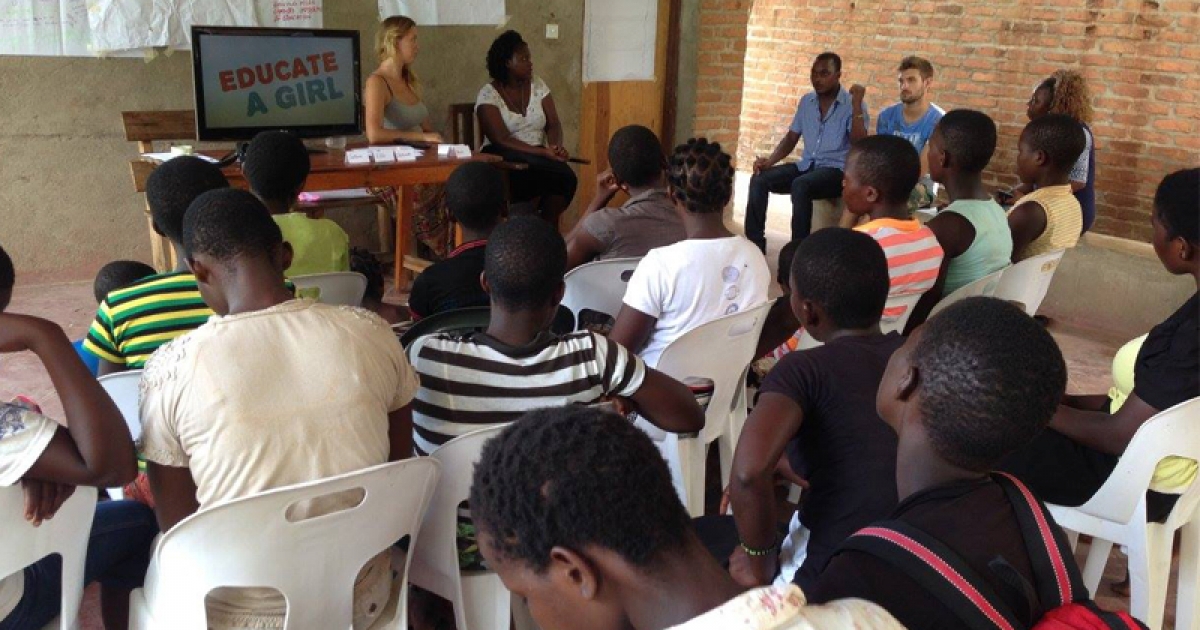“You Can Fall Down, But You Can Still Get Back Up”
Ponelo was born and raised in Malawi. She is committed to reforming girls’ education in the northern part of Malawi. She has a particular interest in improving the accessibility of schooling to homeless individuals, single mothers, and disadvantaged young women who got pregnant and dropped out of school. Ponelo was raised by a single mother who has confronted homelessness and poverty, as a result of her own experiences, she is familiar with the despair and frustration endemic to young women struggling to survive. She is convinced that increasing individuals' access to girls’ education can make the difference between despondency and hope. Ponelo Kalonga's mentor is Souad Talsi MBE.
Q: Tell us a few things about your country, and also your life's story!
A: Malawi is a poor country in terms of wealth, but well known for its friendly and welcoming people. As a subsistence economy, most Malawians live in rural villages along the crystal clear waters of one of the world’s largest and most beautiful lakes: Lake Malawi. Malawi is 90% Christian and 10% Islamic and religion is quite important in dealing with the struggles of everyday life. Malawi is a functioning multiparty democracy and its people boast of the peace that is inherent in their culture.
For all of the hardship, hunger, disease, lack of education and lack of opportunity, the people of Malawi remain optimistic and continue to strive for advancement through hard work and honesty.
I was born and raised in Malawi by a single mother who has confronted homelessness and poverty. As a result of my own experiences, I am familiar with the despair and frustration endemic to young women struggling to survive. I am committed to reforming girls’ education. I have a particular interest in improving the accessibility of schooling to homeless individuals, single mothers, and disadvantaged young women who got pregnant and dropped out of school. I am convinced that increasing individual access to girls’ education can make the difference between despondency and hope. I have made a huge difference in a lot of young women's lives in my community and surrounding areas through the female youth empowerment programme that aims at providing a safe and open place for girls to come together and discuss their experiences, ask questions and provide peer-support for one another. This is achieved through weekly girls groups. This programme targets young females at local primary and secondary schools, in an attempt to tackle the inequality in access to education between males and females.
Q: What is your view of the world as it is today? And how do you define the concept of a better world?
A: I recognise that there are many challenges facing women in the world today, as such my other focus is Women’s Empowerment. I would like to empower local women by helping them grow financial resilience. By supporting women’s groups that will benefit entire communities, as women are more likely to spend their profits to benefit families. Sadly, women in Malawi and in most parts of the world have very few opportunities available to them. I am working to change this by working with women’s groups on programmes that empower beneficiaries, encourage economic growth, and inspire the next generation of girls.
Even for those girls who do attend secondary school, the dropout rate is higher than that of male students because of additional pressures such as early marriage and pregnancy. The United Nations states that over half of girls in Malawi are married by the age of 18.
Q: As a young individual what are a few of the hurdles that you had to overcome up until today?
A: I do believe that if we can enhance adult learning throughout the community, we will be able to build a better platform for development. I introduced adult literacy lessons focusing on reading and writing in the national language of Malawi, Chichewa. These lessons employ a local teacher and are run three times a week. I hope to be able to set up more classes across Dowa to allow women, who rarely have access to a bicycle or public transport, the chance to attend classes. Currently, my largest non-formal education initiative is the Female Youth Empowerment Program (FYEP), which targets young females at local primary and secondary schools, in an attempt to tackle the inequality in access to education between males and females. FYEP aims to address this issue within Dowa by providing a safe and open place for girls to come together and discuss their experiences, ask questions and provide peer-support for one another. This is achieved through two girls group; one of which is held for girls in secondary school and another which is held for girls aged 10-14 attending the two local primary schools.
Q: Why is the role of a mentor important for you?
A: By having a mentor, I am learning from someone who has already arrived at where I want to be. I feel privileged to have a female mentor knows exactly what it takes to get there and what sacrifices need to be made. I also have the rare opportunity to see what it would be like to be in the shoes I want to be in. By having a mentor who is where I want to end up, I can see firsthand what their day to day experience is. This is extremely helpful to me in figuring out if I really want to go down that path. My mentor shares her experience with me to help me achieve my goal in the best possible way she knows how.
Q: Do you have a lesson that life has taught you and you would like to share?
A: I'm so proud of the woman I have become after 11 years of grieving my dad and thinking there is nothing good life could offer me. Having a sick mother and being the eldest of 3 siblings made it even harder for me. Along the way I decided to move on with life and that’s when I truly saw that you can fall down, but you can still get back up. I have learnt from the wasted years and have the opportunity to strengthen and improve in everything I do. Through my own life experiences, I am committed to help young women who went through the same life situations I went through and I feel very proud to see these young women being pushed forward and benefiting from the programmes. Helping disadvantaged young women is now my love. It makes me feel like a better person. Less Brown said “When life knocks you down, try to land on your back. Because if you can look up, you can get up. Let your reason get you back up.”

Q: Name a project, a foundation or a person in your country that you think is doing great work in helping improve other people's lives!
A: Bikema Foundation is a youth Led foundation based in Malawi, which aims at supporting girls in their education and at the same time empowering them to become what they want in life. Some of their activities are:
- Scholarships for girls
- Mentors for girls –peer pressure, standing up to boys and men
- Awards for girls that are doing well in their studies
- Bringing girls in early marriages back to school.
Q: Share with us a phrase, a poem or a story that you love or you find interesting!
A: “Nothing great was ever accomplished alone.” For every goal I have achieved in my life, I can trace back each goal to a mentor or individual who helped achieve it - by Dan Gheesling
Q: Tell us one thing that you have learned from your mentor.
A: When noticed my Mentor is very influential and makes speeches to many people several times a year I asked her how she does that. Souad has guided me to see the importance in establishing connections with people to create lasting, positive impressions. Anytime I asked her about public speaking, she’s always said, “If you feel comfortable, get up there and share some details to a few people around you. Let them know you.”




